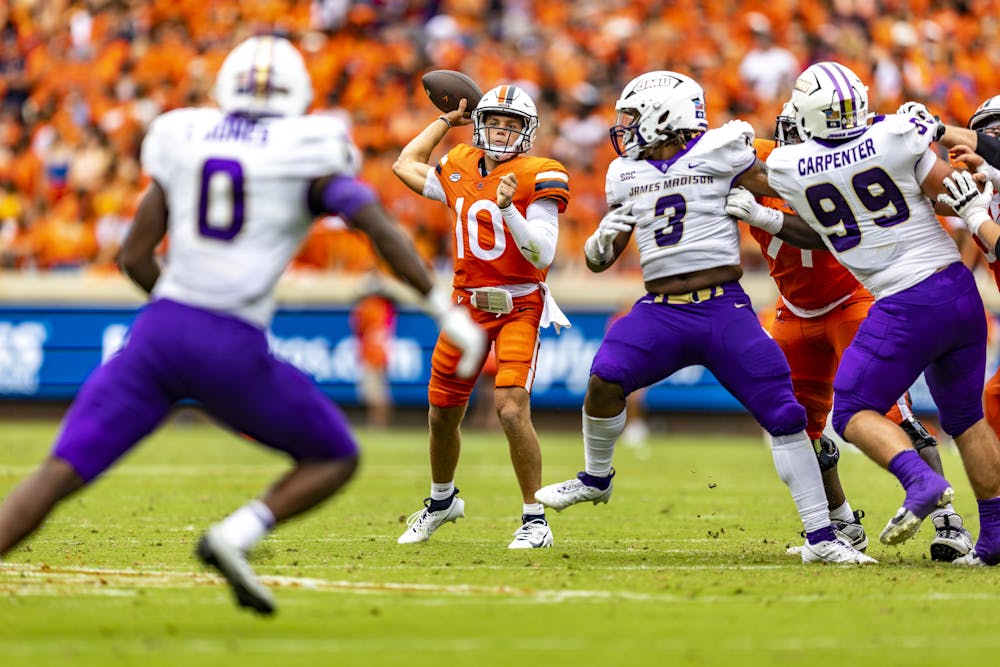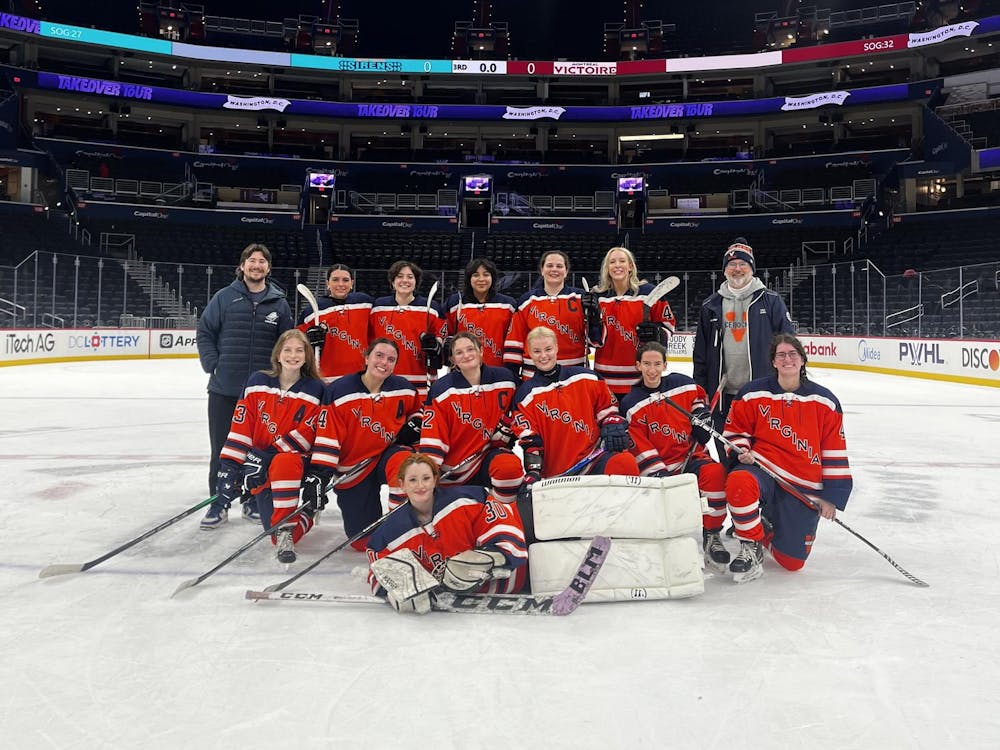2023 has not been a banner year for Virginia football, especially on the offensive side of the ball. The Cavaliers (2-8, 1-6 ACC) fare poorly in almost every traditional offensive stat, ranking 80th or lower in points per game, turnovers per game and yards per game. On a more granular level, the offense has averaged 1.8 points per drive, and 5.15 yards per play, good for 90th and 100th in the country, respectively. In Bill Connelly’s offensive SP+ metric, Virginia ranks 104th.
However, the Cavalier offense has had one consistent positive — its starts. As bad as it has been on any given average drive, the first two drives have been consistent point-getters. Prior to the Louisville game, 25 percent of Virginia’s points came on those first two drives, despite making up closer to 17 percent of their total drives. Their average points per drive jumps to 4.375 on their first two drives of the game, better than national leader Michigan averages over all drives.
Coach Tony Elliott and offensive coordinator Des Kitchings have shown a clear pattern of fielding better offenses earlier in games. The question is why this has been a consistent occurrence and how this performance can be replicated across the other three and a half quarters of football.
One likely culprit for this early success is the practice of scripting plays. This is a process where the coaching staff — sometimes in collaboration with the quarterback — designates several plays they want to run early in the game. These are often plays that worked well in practice or will work well against an opponent's typical defensive setup. For instance, North Carolina likes to blitz and leave their defensive backs in single coverage, potentially leaving graduate wide receiver Malik Washington a favorable matchup. If the quarterback walks to the line of scrimmage and reads a blitz, then he can use that play to throw it deep to Washington for a big gain.
Most coordinators, whether they admit it or not, script at least a few plays. It may not always be the first plays of the game. Scripting ahead of time is also a common sequence of a few plays thrown in at any point during the contest. It is also often used in specific situations, like when an offense is backed up against its own goal line, in the red zone or in the two-minute drill.
There are a lot of advantages to scripting plays. It gives players a clear idea of what the team will run, and those plays are often the best of the best. It also helps give the coordinator structure — if they want to balance the run and pass or lean more heavily on one or the other, then they can plan to do so ahead of time. Scripts can also be used to set up specific plays. Coordinators can script a run call, then later call a play-action pass that initially looks like the earlier run, setting up a big gain.
However, there are some dangers to scripting — even the best plans often go awry, after all. If something happens to knock the script off schedule, then the playcaller is often left scrambling. This could be from something as innocuous as a short run or an incompletion, or as harmful as a sack, turnover or even an injury. These can compromise a whole script and knock out hours of planning, leaving the offense on the back foot, forced to improvise ahead of schedule.
There is a good amount of evidence that Kitchings is scripting his plays early in the game — namely the number of gadget plays the team has run early. This is exemplified by the flea flicker and reverse passes thrown early in the game against Maryland and the early long bomb from Colandrea to Washington against North Carolina State. The team also seems to play much crisper on these drives, committing fewer penalties and seeming to execute much better.
Despite finding early success through Kitchings’ apparent pregame preparation, failure to maintain offensive rhythm late in games has resulted in stagnation or regression in many of Virginia’s losses this season. Scripting risks using all of a team’s effective plays early. Every time a defense sees a certain play concept, they get better at defending it. A play the offense runs in the first quarter will not be as effective in the fourth. The Cavalier playbook is not incredibly advanced, so it is at an especially advanced risk of this fallacy.
The nature of Virginia’s offensive schemes is not the only factor that could be leading to late game struggles. Another explanation for the Cavalier drop-off could be poor conditioning and depth. The offensive depth chart of the ball is incredibly shallow — the offensive line has been a wreck for Elliott’s entire tenure, and while there are several running backs that have carried the load, only two Virginia skill players have more than 15 catches on the year. The lack of back-end talent has likely led to extra fatigue due to the lack of competent backups being able to take snaps. Logically, this could lead to diminishing offensive returns over the course of a whole game. Ultimately, Kitchings’ preparation and gameplanning is only as impactful as the personnel on the field’s ability to execute it over the course of four full quarters.
Overall, the scripted drives early on seem to be working. Virginia’s offense is effective on early drives that, while we cannot confirm, appear to be scripted. However, the offense the rest of the game suffers. The fact of the matter is the Cavalier offense has potential. There are drives where the team executes and the playcalling mixes creativity and effectiveness in a way that has rarely been seen since the heyday of the former coach and coordinator combination of Bronco Mendenhall and Robert Anae.
However, the final picture is not coming together. Virginia has yet to play a complete game on offense all year, and only has one game where the team has scored in all four quarters — the 26-29 overtime loss to Miami. This team has a lot of the tools for success, but needs consistency and — maybe most of all — the scripted offense to translate to all four quarters. While the offense hums in instances where pregame preparation pays off, Kitchings must adapt to the game flow and be unpredictable down the stretch to find consistent success. There are two games left in the season — both at home, against Duke and Virginia Tech. If the offense fails to show up outside the first quarter in either game, look for changes to be made on that side of the ball.







